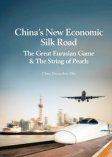China’s Trade Intelligence Gathering Leaving EU Contractors Disadvantaged

China’s massive diplomatic global push may well be paying dividends as intelligence gathered is recorded, processed, and passed onto state owned businesses to profit from. An example is the situation in Poland, where China has been taking a keen interest.
The country is the largest European member of the Cooperation of China and Central Eastern European Countries (CEEC, or 16+1) and is also an investor in the Beijing supported Asian Infrastructure Investment Bank, which despite the name is actually assessing projects throughout Eurasia. China is especially interested in Poland for two reasons: the country is a gateway to the markets of the EU and is directly linked via rail to China. It also announced just two years back it’s Morawiecki Plan, also known as the Strategy for Responsible Development (SRD).
According to the plan, Poland is looking to invest more than 1,500 billion zloty (€370 billion) from public funds and about 600 billion zloty (€144 billion) from private sources in infrastructure and industry projects in the next two years to improve the country’s competitiveness internationally. When the plan was first presented, about 50 percent of this money was expected to come from the EU.
EU members are not permitted to borrow funds from sources external to the EU, and the Morawiecki Plan is intended to be financed either through Poland’s own sovereign wealth, its private sector, or via operational programs backed by EU funds.
However, Krzysztof Senger, executive vice-president at the Polish Investment and Trade Agency has stated that “The Chinese model of investing in Africa and central Asia is not suited for central and eastern Europe – but we invite Chinese companies and investors to look at the different tenders”.
This comes at a time when the fiscal realities of Brexit are starting to create concerns among EU member states – reluctant to plug the gap left by the UK’s future non-contribution. If correct, that is likely to result in belt tightening in Brussels, with previously available infrastructure development cash being harder to find. EU-based contractors have been sharply critical of tenders for EU projects being handed out to non-EU contractors – the recent complaints over the processes concerning the awarding of a bridge contract in Croatia being a case in point.
One of the Morawiecki Plan initiatives earmarked as suitable for Chinese investors is a so-called ‘Central Communication Port’. This hub is to be built around a new airport to service the capital’s logistics, possibly in Stanisławów, 40 km from Warsaw. The proposal is to create a transportation hub combining multi-modal transports such as air, rail, and road. The Polish government also wants to reconstruct several seaports in its quest to turn Poland into a key European logistics center.
A second multi-billion dollar project, which the government will seek to finance, is the creation of the country’s first nuclear power plant. Both projects are ideal for Chinese contractors, long experienced in building nuclear power plants as well as port, roads, and rail. However, the hoovering up of infrastructure projects in Poland is unlikely to be looked on favorably in Brussels. EU contractors will become increasingly upset as key projects are whisked away from them by competing Chinese bids. A problematic, underlying issue within Brussels, however, is the widespread assumption that if you are critical of the EU, then you are not relevant. This projects unity, but at the expense of policy reassessment.
Questions will later loom as to the very nature of how the EU’s own development strategy and that of its member countries pans out. Clearly the way ahead in what may well be ushering in a new era of relative EU austerity and increasingly competitive contractors is the need to restructure economies to service new supporting industries.
Meanwhile, the connections between the Morawiecki Plan and how the Chinese obtain and develop their own business intelligence to be on the scene when infrastructure contracts are being awarded, illustrates a Chinese art of conducting research to a highly impressive degree. In this regard, the EU, despite funding many of these projects, is being left behind in trade intelligence and the provision of corporate support.
About Us
Silk Road Briefing is produced by Dezan Shira & Associates. The firm provides investment intelligence, legal, tax and advisory services to foreign investors throughout the Asian region, and maintains a Belt & Road Initiative intelligence team. Please contact us at silkroad@dezshira.com or visit www.dezshira.com for further assistance.
 Related Reading:
Related Reading:
![]() China Moves in on Balkans after EU Promotes “Connectivity” rather than Membership
China Moves in on Balkans after EU Promotes “Connectivity” rather than Membership
![]() Winners & Losers in the EU’s Digital Connectivity with China & the OBORSphere
Winners & Losers in the EU’s Digital Connectivity with China & the OBORSphere
China’s New Economic Silk Road
This unique and currently only available study into the proposed Silk Road Economic Belt examines the institutional, financial and infrastructure projects that are currently underway and in the planning stage across the entire region. Covering over 60 countries, this book explores the regional reforms, potential problems, opportunities and longer term impact that the Silk Road will have upon Asia, Africa, the Middle East, Europe and the United States.






